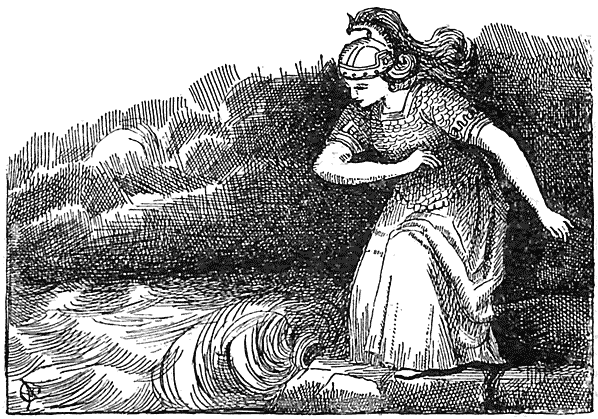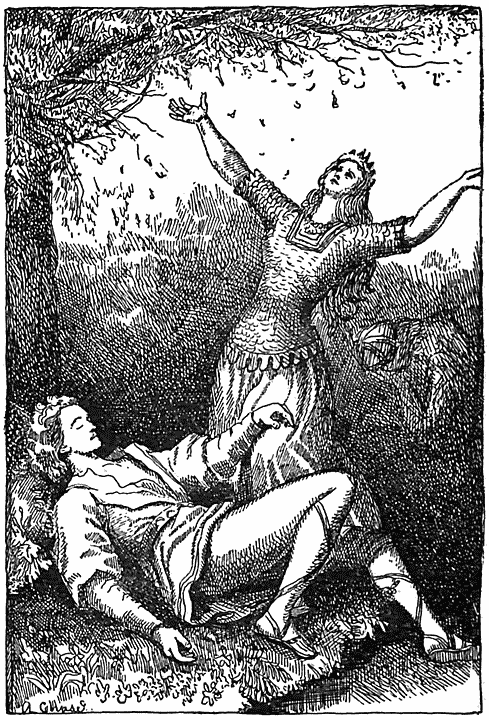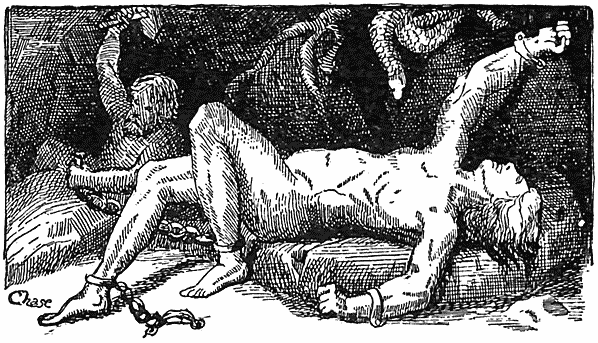I'm posting today's story early as Saturday I will be telling stories of Holidays Around the World at Pere Marquette District Library in Clare at the time I usually publicize my blog.
THE DYING BALDUR.
Ages upon ages had rolled away. And now the day of sorrow, which always Odin had known must come, drew near.
Already the god of song had gone with his beautiful wife Idun down into the dark valley of death; and there was a new strange rustle among the leaves of Ygdrasil, like the rustling of leaves that were dead.
Odin’s face grew sad; and, try as he would, he could not join with the happy gods about him in their joys and festal games.
“Odin,” said Frigg one day, “tell me what grieves thee; what weighs thee down and puts such sadness into thine eyes and heart.”
“Baldur himself shall tell you all,” answered Odin sadly.
Then Baldur seated himself in the midst of the gods and said: “Always, since Odin drank at the Well of Wisdom, and learned the secrets of the past and of the future, has he known that a time would come when the light must go out from Baldur’s eyes; and he, although a god, must go down into the dark valley. Now that time draws near. Already have Brage and Idun gone from us; and with them have gone song and youth. Soon will Baldur go, and with him must go the light and warmth he has always been so glad to bring to Asgard and to Midgard both.”
“O Baldur! Baldur! Baldur! My Child! my child! my child!” cried Frigg. “This cannot be! this shall not be! I will go down from Asgard. I will go up and down the earth, and every rock and tree and plant shall pledge themselves to do no harm to thee.”
“Dear mother Frigg,” sighed Baldur, “you cannot change what is foretold. From the beginning of time this was decreed, that one day the light should go out from heaven and the twilight of the gods should fall.”
There was a long silence in the hall of Asgard. No god had courage to speak. Their hearts were heavy, and they had no wish to speak.
The sun sank behind the western hills. Its rich sunset glow spread over the golden city and over the beautiful earth below. Then darkness followed slowly, slowly creeping, creeping on, up the mountain side, across the summit, until even the shining city stood dark and shadowy beneath the gathering twilight.
“Like this, some day, the twilight will fall upon our city,” said Odin; “and it will never, never rise again.”
The mother heart of Frigg would not accept even Odin’s word. And when the sun’s first rays shot up above the far-off hills, Frigg stole forth from Asgard down the rainbow bridge to Midgard.
To every lake, and river, and sea, she hurried, and said: “Promise me, O waters, that Baldur’s light shall never go out because of you.”
“We promise,” the waters answered. And Frigg hurried on to the metals. “Promise me, O metals, that Baldur’s light shall never go out because of you.”
“We promise,” answered the metals. And Frigg hurried on to the minerals. “Promise me, O minerals,” she said, “that Baldur’s light shall never go out because of you.”

“We promise,” answered the minerals. And Frigg hurried on to the fire, the earth, the stones, the trees, the shrubs, the grasses, the birds, the beasts, the reptiles; and even to the abode of pale disease she went. Of each she asked the same earnest, anxious question; and from each she received the same kind, honest answer.
As the sun sank behind the high peaks of the Frost giants’ homes, Frigg, radiant and happy, her eyes bright and her heart alive with hope, sped up the rainbow bridge. Triumphant, she hurried into the great hall to Odin and Baldur.
“Be happy again, O Odin! Be happy again, O Baldur! There is no danger, no sorrow to come to us from anything in the earth or under the earth. For every tree has promised me; and every rock and every metal; every animal and every bird. Even the waters and the fire have promised that never harm through them shall come to Baldur.”
But, alas, for poor Frigg. One little weed, a wee little weed, hidden beneath a rock, she had overlooked. Loke, who had followed closely upon her in all her wanderings through the day, had not failed to notice this oversight of Frigg’s. His wicked face shone with glee. His eyes gleamed; and as the radiant Frigg sped up the rainbow bridge, he hurried away to his home among the Frost giants to tell them of the little weed which, by and by, should work such harm to Baldur, in shutting out his life and light from Asgard and the earth.
The ages rolled on. Every one in Asgard, save Odin, had long ago thrown off the shadow of fear. “No harm can come to Baldur,” they would say; and all save Odin believed it.
But a day came when Odin, looking down into the home of the dead, saw there the [spirits moving about, hastening hither and thither.
“Something is happening there in the pale valley,” said Odin. “They are preparing for the coming of another shade. And it must be some great one who is to come. See how great the preparation is they make.”
“We prepare for the coming of Baldur,” answered the shades as Odin came upon them, busy in their work. “We prepare a throne for Baldur. We prepare a throne for Baldur.”
“For Baldur?” asked Odin, his heart sinking. “For Baldur!” chanted the shades. “For Baldur! Baldur cometh! Baldur cometh!”
And Odin, his godlike heart faint and sick at the thought, turned away and went slowly up the rainbow bridge.
There, in the great garden of the gods, he found Thor
and Baldur and their brother
Hodor playing at tests of strength. Behind Hodor, invisible, stood Loke. In his hand he held a spear.
“Shame upon you, Hodor,” whispered Loke, “that you, the strong and mighty Hodor, cannot overcome Baldur in a test of strength. Baldur may be beautiful and sunny, and he is a great joy to the world; that we know. But what is he compared with Hodor for strength?”
“But the spears will not touch him. See how they glance away. Indeed it is true: Light cannot be pierced.” answered Hodor, good-naturedly.
“Take this spear,” said Loke, quietly. “It is less clumsy than those you throw.”

BALDUR, THE BEAUTIFUL, IS DEAD.
Hodor took it, never thinking of any harm. Alas for Baldur and Asgard and all the happy smiling Earth! It was a spear tipped with the mistletoe—the one plant that Frigg had failed to find. The one plant that had not promised to do no harm to Baldur.
Quickly the spear flew through the air. One second, and Baldur the Summer Spirit, Baldur the Light of the Earth fell—dead.
“O, Asgard! Baldur is dead!” groaned Odin. “O Asgard, Asgard! Baldur is dead!”
Hodor, Thor, the gods, one and all, stood pale and white. A terrible fear settled over their faces. They shook with terror.
And even as they stood there, speechless in their grief, a twilight dimness began to fall lightly, lightly over all. The shining pavements grew less bright; the blue of the great arch overhead deepened; and in the valleys of Midgard there were long black shadows. Baldur was dead. The light had failed. The golden age was at an end. Now, even the gods must die.

***
The shortest explanation of mistletoe and kissing is given in this "AI Overview"
Mistletoe is featured in many mythologies and has been associated with a variety of meanings, including fertility, love, and peace: Norse mythology
Remember not to eat the berries as they are poisonous! So keep them away from children -- another good reason to hang them high and out of reach. May you stay around mistletoe, kissing or not, with plenty of love and peace for the holidays.
*****
This is part of a series of postings of stories under the category, “Keeping the Public in Public Domain.” The idea behind Public Domain was to preserve our cultural heritage after the authors and their immediate heirs were compensated. I feel strongly current copyright law delays this intent on works of the 20th century. My own library of folklore includes so many books within the Public Domain I decided to share stories from them. I hope you enjoy discovering them.
At the same time, my own involvement in storytelling regularly creates projects requiring research as part of my sharing stories with an audience. Whenever that research needs to be shown here, the publishing of Public Domain stories will not occur that week. This is a return to my regular posting of a research project here. (Don't worry, this isn't dry research, my research is always geared towards future storytelling to an audience.) Response has convinced me that "Keeping the Public in Public Domain" should continue along with my other postings as often as I can manage it.

No comments:
Post a Comment